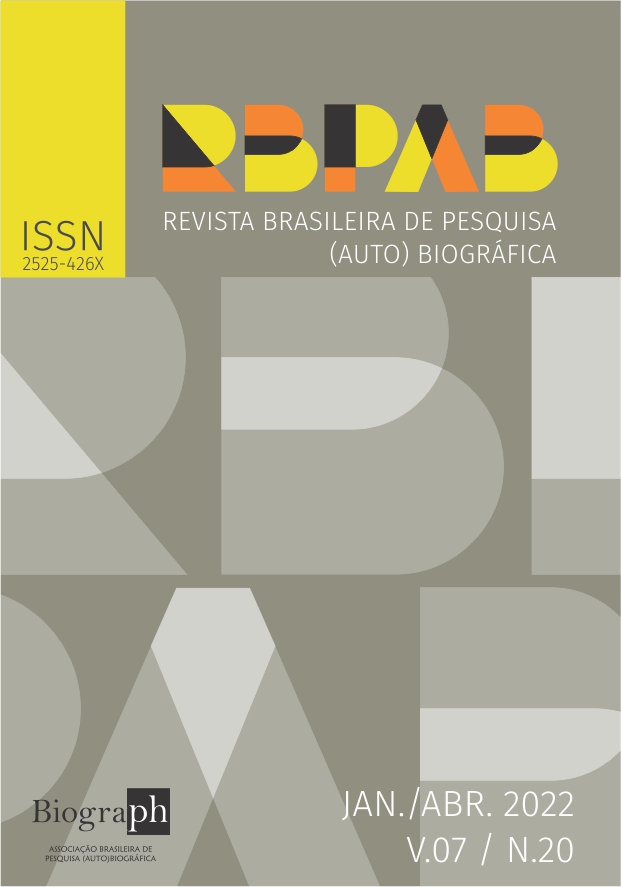Autoformação Docente na experiência de Supervisão do Pibid: Transações para uma práxis pedagógica emancipatória na Educação Física
DOI:
https://doi.org/10.31892/rbpab2525-426X.22.v7.n20.p241-246Keywords:
Autoformação docente. Racionalidade dialógica-reflexiva. Práxis emancipatória. Pibid. Educação física.Abstract
The object of this thesis proposes the problematization of teacher self-training through dialogical-reflexive rationality under the supervision of the Institutional Scholarship Program for Initiation in Teaching (Pibid). The investigative stance is based on the heuristic of educational phenomena that resort to (inter)subjectivities due to the reality of the production of meanings, life history and teacher education for a humanizing act. In this perspective, the general objective of the thesis was to understand teacher self-training, in heuristic transactions, engendered by the dialogical-reflexive rationality in the Pibid supervisory experience, constituting a contribution to the emancipatory pedagogical praxis in Physical Education. Mobilized by a non-linear reading of the theoretical-empirical field, we invested, thus, in an ethno-research formation with a dialectical and dialogical dispositions through critical hermeneutics whose ethnomethods/analysis devices were: Implied observation/Diary of Itinerance; Training memorials; Reflexive circles; Narrative interviews.The empirical field, in turn, was the subproject of Pibid of the Federal Institute of Education, Science and Technology of Ceará (IFCE) campus Canindé, observed based on and by the experience of three supervising teachers. The historical (re)reading and conceptual reiteration about teacher self-training has its anchor in the writings of Gaston Pineau (time frame from 1983-2020), which allowed an articulation of thought-action explained in the: ontological, epistemological and methodological dimensions, worked on by Therrien (2014). These ones cover this concept from the triad: alterity, reflexivity and dialogicity in which movement in the experience of supervision of PIBID was engendered in the reiteration of a dialogical-reflexive rationality. Therefore, we affirm in and through otherness the willing to reflect on the respect for difference and social coexistence, understanding that talking about self-training does not mean learning alone, nor dispensing with a trainer, approaching the singular-plural existence in which they apprehend relationships with themselves and with others, through the itineraries of learning. We translate the reflexivity as a movement for teaching autonomy, realizing the transitions from naive curiosity to epistemological curiosity, that are related to the mobilization of scientific knowledge in awareness of being and doing pedagogical, with a view to deepening the levels of reflection. Besides, we affirm dialogicity as a place of political and critical awareness, establishing links with social transformation and having the dialogue as a path of human significance, issued by the ethical and aesthetic dimension as a self-forming dimension. Based on this theoretical-empirical investment, it was possible to verify that, in general, alterity (54 statements) proved to be a greater self-forming power, followed by dialogicity (39 statements) and reflexivity (28 statements) for the supervising teachers under Pibid supervisory experience. At the same time, each supervising teacher had their own singularities projected towards these referents. Lastly, it is evident that an educational phenomenon that affirms itself as a self-forming process is substantially based on the transactions of alterity, reflexivity and dialogicity, in an amalgamated way and in a straight movement to a dialogical-reflexive rationality. So, we reassure how important the permanence of the feeling-thinking-acting of the teacher self-education in Physical Education implied in a dialectical and dialogical relationship capable of supporting a cultural (re)action in oppressive contexts to legitimize the teacher autonomy, consolidating an anthropo-formation perspective through intersubjectivity. Thus, the permanent recursion on the dialogical-reflexive rationality is placed as a form of human emancipation in a constant becoming of “being more” in and through educational praxis, in implication of political and social struggle and (self)critical resonance.
Downloads
References
PINEAU, Gaston. Les volontaires d’ATD Quart Monde: des passeurs et des casseurs de frontières. In: BRUN, Patrick et 12 membres actifs. À la reencontre des milieux de pauvreté. De la relation personnelle à l’action collective. Lyon: Chronique Sociale, 2014. p.212-218.
PINEAU, Gaston. Voyages, mobilité et rythmes de déplacement. Le Journal des Psychologues, [S.l.], n.5, p.26-31, 2010.
PINEAU, Gaston. As histórias de vida em formação: Gênese de uma corrente de pesquisa-ação-formação existencial. Educ. Pesqui. São Paulo, v.32, n.2, maio/ago. 2006, p.329-343. Disponível em: https://www.scielo.br/pdf/ep/v32n2/a09v32n2. Acesso em: 2 set. 2020.
PINEAU, Gaston. Emergência de um paradigma antropoformador de pesquisa-ação-formação transdisciplinar. Saúde e Sociedade, São Paulo, v.14, n.3, set./dez. 2005. p.102-110. Disponível em: https://www.scielo.br/pdf/sausoc/v14n3/06.pdf. Acesso em: 2 set. 2020.
PINEAU, Gaston. Temporalidades na formação: rumo a novos sincronizadores. São Paulo: Triom, 2004.
PINEAU, Gaston. A autobiografia no decurso da vida: Entre a hetero e a ecoformação. In: FINGER, M; NÓVOA, A. O método (auto) biográfico e a formação. Cadernos de Formação1. Lisboa: MS, 1988. p.65-77.
PINEAU, Gaston. A autoformação no decurso da vida: Entre a eco e a heteroformação. In: NÓVOA, A.; FINGER, M. O método (auto)biográfico e a formação. Lisboa: MS, 1987. p.75-78.
PINEAU, Gaston. Produire sa vie: produire sa vie autoformation et autobiographie. Paris: Edilig; Montréal: St Martin. 1983.
THERRIEN, Jacques. Novos contextos da pós-graduação em educação: uma reflexão sobre parâmetros que permeiam a formação para o saber profissional. Trabalho apresentado em Mesa Temática sobre Pós-graduação acadêmica e profissional em educação: perspectivas epistemológicas, diferenças e desafios. In: ENCONTRO DE PESQUISA EDUCACIONAL DO NORTE E NORDESTE, 22. 2014. Natal. Anais [...] Natal: Epenn, 2014.













































